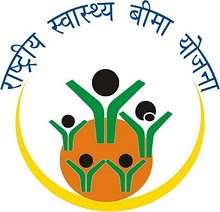This article needs to be updated. (March 2018) |
Rashtriya Swasthya Bima Yojana (RSBY, literally "National Health Insurance Programme",[1]) is a government-run health insurance programme for the Indian poor. The scheme aims to provide health insurance coverage to the unrecognised sector workers belonging to the BPL category and their family members shall be beneficiaries under this scheme.[2] It provides for cashless insurance for hospitalisation in public as well as private hospitals. The scheme started enrolling on April 1, 2008 and has been implemented in 25 states of India.[3] A total of 36 million families have been enrolled as of February 2014.[4] Initially, RSBY was a project under the Ministry of Labour and Employment. Now it has been transferred to Ministry of Health and Family Welfare from April 1, 2015[5]
| Rashtriya Swasthya Bima Yojana (RSBY) | |
|---|---|
 | |
| Country | India |
| Prime Minister(s) | Dr. Manmohan Singh |
| Launched | 1 April 2008 |
| Status | Active |
Every "below poverty line" (BPL) family holding a yellow ration card pays ₹30 (36¢ US) registration fee to get a biometric-enabled smart card containing their fingerprints and photographs.[1] This enables them to receive inpatient medical care of up to ₹30,000 (US$360) per family per year in any of the empanelled hospitals. Pre-existing illnesses are covered from day one, for head of household, spouse and up to three dependent children or parents.[3]
In the Union Budget for 2012–13, the government made a total allocation of ₹1,096.7 crore (US$130 million) towards RSBY. Although meant to cover the entire BPL population, (about 37.2 per cent of the total Indian population according to the Tendulkar committee estimates) it had enrolled only around 10 per cent of the Indian population by March 31, 2011. Also, it is expected to cost the exchequer at least ₹3,350 crore (US$400 million) a year to cover the entire BPL population.[6]
The scheme has won plaudits from the World Bank, the UN and the ILO as one of the world's best health insurance schemes. Germany has shown interest in adopting the smart card based model for revamping its own social security system, the oldest in the world, by replacing its current, expensive, system of voucher based benefits for 2.5 million children.[7] The Indo-German Social Security Programme, created as part of a co-operation pact between the two countries is guiding this collaboration.[8][7]
One of the big changes that this scheme entails is bringing investments to unserved areas. Most private investments in healthcare in India have been focused on tertiary or specialized care in urban areas. However, with RSBY coming in, the scenario is changing. New age companies like Glocal Healthcare Systems, a company based out of Kolkata and funded by Tier I Capital Funds like Sequoia Capital and Elevar Equity are setting up State of Art Hospitals in Semi Urban - rural settings. This trend can create the infrastructure that India's healthcare system desperately needs.[9]
As per report from Council for Social Development, it was found that this scheme has not been very effective. Increase in outpatient expenditure, hospitalization and medicines have compelled insurance companies to exclude several diseases out of their policies and thus making it not affordable for BPL families.[10] Report also has found that most of the beneficiaries are from higher classes and not targeted beneficiaries.
Ayushman Bharat - Pradhan Mantri Jan Aarogya Yojana (PMJAY) is proposed to subsume RSBY and provide an insurance cover of ₹0.5 million (US$6,000) each to 10 crore families.[11]
See also
editReferences
edit- ^ a b Jackie Range. "India's poor get healthcare in a card". Wall Street Journal. Retrieved 26 February 2011.
- ^ "Rashtriya Swasthya Bima Yojana | India Portal". india.gov.in. Retrieved 11 August 2016.
- ^ a b "About RSBY". Ministry of Labour and Employment. Retrieved 26 February 2011.
- ^ "Rashtriya Swasthya Bima Yojana".
- ^ "RSBY:National Summary". Ministry of Labour and Employment. Retrieved 26 February 2011.
- ^ "Healthy outlook in Budget". The Hindu BusinessLine. 22 March 2012.
- ^ a b Dr. Saumitra Mohan (15 May 2017). "10.7 - Rashtriya Swasthya Bima Yojana (RSBY)". Indian policy and development. McGraw-Hill Education. p. 72. ISBN 9789352606740. Retrieved 3 January 2020., Citation: Currently revamped RSMY covers three crore workers...RSBY will be responsible for providing secondary healthcare benefits also.'.
- ^ "German delegation visiting India to take Rashtriya Swasthya Bima Yojana lessons". The Economic Times. 6 August 2012. Archived from the original on 19 December 2013.
- ^ "Rural India looking for high quality healthcare". The Economic Times. 3 February 2012. Archived from the original on 10 August 2013.
- ^ "Poor risk cover". The Hindu.
- ^ "Less than half of budgeted allocation for Modicare released: Parl panel report", Hindustan Times, 13 March 2018